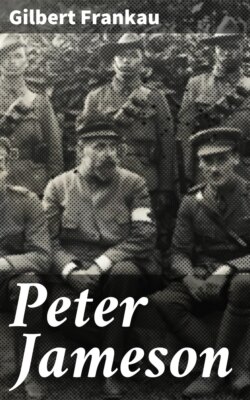Читать книгу Peter Jameson - Gilbert Frankau - Страница 18
На сайте Литреса книга снята с продажи.
§ 2
ОглавлениеTable of Contents
Peter Jameson paid his taxi; threw away the stump of his after-breakfast cigar; and walked straight through the open doors of the goods entrance into his factory.
He was neither an over-imaginative nor a romantic person, this quiet gray-eyed young man in the bowler hat and the well-cut tweed overcoat: but he never could look at that big glass-roofed building, at the work-girls in their clean smocks, at the vague forms of machinery whirling away behind their frosted-glass partitions, at the men pricking and soldering the vacuum export-tins (plunged base-deep in hot sand to expel the corrupting air), at the great bins of sweet-smelling tobacco—at the whole paraphernalia of this living entity he was creating—without a certain thrill of satisfaction. He had given up a good deal for this same Nirvana—leisure, money, his gun in the little Norfolkshire shoot, trout fishing, the possibility of a car. But Nirvana, almost home! was worth it.
Ivan Turkovitch bustled out from behind one of the partitions; trotted over.
“Vell, Petere. And how are you? Come overe and see de new machine. Ve are just getting him put up. Peautiful!”
The small hands gesticulated satisfaction; the tawny beard waggled accompaniment. Like the rest of his “vork-peoples,” Turkovitch wore a smock. It made him a rather grotesque little figure.
But Turkovitch’s satisfaction, as an artist, with the growth of the factory, was only superficial. As a man, a man of small ideas, he could not grasp the ultimate scheme, the big conception which inspired Peter. Frankly, it frightened him. More orders and more orders! More expenses and more expenses! What would be the end? He—Ivan Turkovitch—had never wanted a vast business; felt himself incapable of controlling it.
“Peautiful,” he said again, as they stood in the machine-room. Overhead, fly-wheels whirled, driving-belts clacked. On the clean hardwood floor, the three machines stamped and clicked at their endless tasks. Perched on high seats, girls fed the hoppers with flocky golden armfuls of tobacco. The machines swallowed it; spewed it forward, forcing it through steel tubes into a rod: drew up paper from the slow-moving reels; wrapped it about the tobacco; printed it; chopped the paper-covered rod into cigarettes; delivered them to the waiting hands of the girls who patted them into wooden trays. A shirt-sleeved mechanic tended each machine, now this part, now that. Sparks spurted as deft grindstone met swift-revolving knife. The fourth and newest “U.K.” was not yet working: by it, adjusting, measuring, screwing up a bolt here and there, stood a German workman.
For the “United Kingdom” Cigarette-machine was not made in this England, where craftsmen starved while Free Traders preached to them!
Turkovitch spoke to the German; queried something.
“Dass ist mir verboten,” said the man. “Es muss genau so gemacht werden.”
“What does he say?” asked Peter.
“He says he cannot do what I ask him. It is forbidden. Never mind, when he goes back to Hamburg, we do it ourselves. They do not know everything, these Germans.”
They passed on; through the drying-rooms; and the cutting-rooms where girls picked-over the dried leaves and “blenders” fed them into presses that forced the thick mass forward to the dropping knife; through the label-printing room; into the main factory again; past the box-making tables where more girls laboured with paste-brush and zinc-board; and the packing tables, piled high with filled boxes waiting their seals; into the stock-room.
“Rather low, aren’t we?” queried Peter, looking at the half-empty shelves.
“Very low, Sir?” said the dispatch-forewoman, busy making up the day’s orders.
“You go on with your vork, Mary,” snapped Turkovitch. The woman went out of the room, leaving them alone.
“Look here, Turkovitch”—Peter’s gray eyes had grown just a shade darker—“you know I won’t stand that sort of thing. I spoke to the girl; and she answered me. You’ve no right to be rude to her.”
The little man became apologetic. … “But you do not understand the vork-peoples, Petere. You have never been one of the vork-peoples. I have. De vork-peoples they do not respect you ven you talk nicely to them.”
“Don’t you believe it, Turkovitch”—the quarrel between them was an old one—“the ‘vork-peoples,’ as you call them, respect a man who respects them; who knows what he wants, and tells them how he wants it done—decently.”
Ivan, inventing an excuse, went back to the machine-room. “How on earth I shall ever be able to introduce the copartnership system into this place with that Hungarian obstructionist in charge,” thought Peter, “the Lord knows.” He stood there with his hands in his pockets for a minute or two: then, lighting a cigar, strode off to Bramson’s room.
